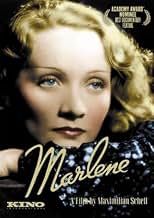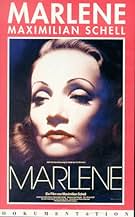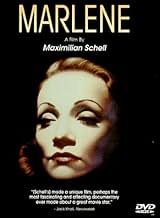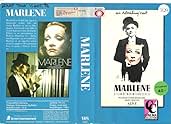Ajouter une intrigue dans votre langueRetrospective on the career of enigmatic screen diva Marlene Dietrich.Retrospective on the career of enigmatic screen diva Marlene Dietrich.Retrospective on the career of enigmatic screen diva Marlene Dietrich.
- Réalisation
- Scénario
- Casting principal
- Nommé pour 1 Oscar
- 5 victoires et 2 nominations au total
Avis à la une
Today I watched a documentary on Marlene Dietrich titled 'Marlene'. It was produced in 1984 and directed by Dietrich's "Judgment at Nuremberg" co-star Maximilian Schell. I don't know how many of you know this, but Marlene agreed to do the film only if the director was in compliance with her wish not to be photographed, and because of this she does not appear in the film. But her Paris apartment is recreated to give the illusion that the actress is really there. Her voice, however, is used as the narration through the film, which is aided with various clips of her movies, concert performances and newsreel footage.
To begin with, Marlene shows little interest in this whole film -- it's obvious -- and even less interest in the discussion of her movies -- that's, sadly, even more obvious. I'm convinced now more than ever that she never enjoyed working on a movie. Still, it's nice to discover that she is able to remember her experiences with a lot of clarity, sometimes using the German word "kitsch" (worthless) to describe most of her film work; although I may disagree with her on some. Marlene also talks about other things besides her films. Her singing career and personal life are briefly discussed, as well as Jean Gabin, Ernest Hemingway, Josef von Sternberg and her marriage to Rudolph Sieber.
It's a strange documentary that you can't help but like. And not everything you would like to hear (even if you consider them important in her life) is mentioned a whole lot in this; such as the war years, where Marlene's tireless efforts to entertain the allied troops stationed at the front, seemed neglected. I remember hearing Schell saying to Marlene in the beginning of the film that he didn't want this to be a typical A-B-C from childhood to present interview. Well, perhaps it would've worked better had it been that way. Much of it was a mess -- not difficult to follow necessarily -- just may have been easier on Marlene's temper had there been some kind of order to the whole thing. Maybe.
It gets a little heated towards the end of the film. Schell seems to have angered Marlene at one point by pressing her for a comment on one of her movies. I don't know how serious it was after the tape stopped rolling, but she evidently wasn't amused. In the end, it becomes apparent to the viewer how cranky Dietrich is at this point in her life. You could argue that it might have something to do with her age, but I think it has more to do with the fact that she was an incredibly disciplined woman who favored manners and intelligence over such common habits like idle gossip and unpreparedness. In fact, her attitude during this film is so overwhelming to the point where it's just sad. She may sound bitter, but she's a woman worth listening to regardless. Watching this documentary gives Riva's book even more credibility, in my opinion, especially in the final years of Dietrich's life where you wonder if all those incidents you read about were true.
To begin with, Marlene shows little interest in this whole film -- it's obvious -- and even less interest in the discussion of her movies -- that's, sadly, even more obvious. I'm convinced now more than ever that she never enjoyed working on a movie. Still, it's nice to discover that she is able to remember her experiences with a lot of clarity, sometimes using the German word "kitsch" (worthless) to describe most of her film work; although I may disagree with her on some. Marlene also talks about other things besides her films. Her singing career and personal life are briefly discussed, as well as Jean Gabin, Ernest Hemingway, Josef von Sternberg and her marriage to Rudolph Sieber.
It's a strange documentary that you can't help but like. And not everything you would like to hear (even if you consider them important in her life) is mentioned a whole lot in this; such as the war years, where Marlene's tireless efforts to entertain the allied troops stationed at the front, seemed neglected. I remember hearing Schell saying to Marlene in the beginning of the film that he didn't want this to be a typical A-B-C from childhood to present interview. Well, perhaps it would've worked better had it been that way. Much of it was a mess -- not difficult to follow necessarily -- just may have been easier on Marlene's temper had there been some kind of order to the whole thing. Maybe.
It gets a little heated towards the end of the film. Schell seems to have angered Marlene at one point by pressing her for a comment on one of her movies. I don't know how serious it was after the tape stopped rolling, but she evidently wasn't amused. In the end, it becomes apparent to the viewer how cranky Dietrich is at this point in her life. You could argue that it might have something to do with her age, but I think it has more to do with the fact that she was an incredibly disciplined woman who favored manners and intelligence over such common habits like idle gossip and unpreparedness. In fact, her attitude during this film is so overwhelming to the point where it's just sad. She may sound bitter, but she's a woman worth listening to regardless. Watching this documentary gives Riva's book even more credibility, in my opinion, especially in the final years of Dietrich's life where you wonder if all those incidents you read about were true.
MARLENE (1984) is a documentary of one of the 20th cetury's most alluring women.
As I write this (late Oct, '11), we've just had the passing of APPLE CEO, Steve Jobs, and, these 2 different people have a lot in common:
They both were very controlling of their image.
Marlene was discovered, molded by director Josef von Sternberg. As the world, and media were quite different, Marlene was molded in different ways. Everything - from (supposedly) having her back molars removed, to the way she was lit - EVERYTHING was tightly controlled.
I say this, because when MARLENE's director (and one-time Dietrich co-star) Maximillian Schell approached Dietrich, she said yes (Ms. Dietrich had for the past 20 years, had become a virtual recluse - her only prior screen appearance - JUST A GIGOLO, had featured Ms. Dietrich behind both gauze, and diffusion filters on the lens - he felt he would 'direct.'
However, one of Ms. Dietrich's stipulations, was that she not be filmed - only allowing her voice to be recorded.
I can understand both Mr. Schell's disappointment with this arrangement, but, I also understand Ms. Dietrich's urge to control her image.
She wanted to till be perceived by her fans as she once was.
It's apparent to the viewer that Ms. Dietrich felt that at this point (1984) her life was, in essence - over.
Whether you agree or not, bear in mind that this is the view of a woman, who, from her teen years onward, hab been so controlled, that, as the years had passed, she was at a point in her life where (she felt) she could no longer 'create' the illusion of 'Marlene Dietrich.'
Let me give a quick background;
When film work became scarce, Marlene moved to the stage, where she did her incredible stage shows, but, even then - everything the public saw, was heavily controlled: lighting, the clothing (heavy under-boning, built in, to give Ms. Dietrich a 'va-va-voom' look.
I can't recall who said it, but, someone had seen one of her stage performances, where she appeared (well in to her 60's!) as the eternally gorgeous Marlene Dietrich.
He went backstage, and said he saw an 'old woman - ironing.'
That was Ms. Dietrich, sans the lighting, the makeup, the beautifully constructed gowns.
So, it is with bearing this in mind, that, by '84, Ms. Dietrich had long ago retired, from 'life,' - the artificially created, maintained 'Marlene Dietrich,' only allowing those most intimate to see her.
Having said this, I can understand both Mr. Schell's disappointment with this arrangement, but, I also understand Ms. Dietrich's urge to control her image.
She wanted to till be perceived by her fans as she once was.
What the end result is, is a dialogue between Ms. Dietrich and, Mr.Schell - as the two watch Marlene's films, and comment on them.
'Shhmutz,' (a German word meaning dirt) as well as 'kitsch' (tasteless), are two words that Ms. Dietrich uses to describe many of her best-loved, classic films.
I think a large part of this film is what's NOT seen - NOT heard.
The voice - still strong - is that of a woman, who sees herself, her life, as being one big performance, and, sadly, doesn't see the love, and adulation, but can only view her 'professional' self, and all it's imperfections, with a cold, clinical eye.
Mr. Schell, who is obviously a fan, as well as an actor/director - tries though MARLENE to subtly get Ms. Dietrich to open up, and see the love, but, sadly, that never happens.
As a fan of hers, I could laugh at her jokes, but, I still felt melancholic.
You wish: 'if only she knew.'
If only.
As I write this (late Oct, '11), we've just had the passing of APPLE CEO, Steve Jobs, and, these 2 different people have a lot in common:
They both were very controlling of their image.
Marlene was discovered, molded by director Josef von Sternberg. As the world, and media were quite different, Marlene was molded in different ways. Everything - from (supposedly) having her back molars removed, to the way she was lit - EVERYTHING was tightly controlled.
I say this, because when MARLENE's director (and one-time Dietrich co-star) Maximillian Schell approached Dietrich, she said yes (Ms. Dietrich had for the past 20 years, had become a virtual recluse - her only prior screen appearance - JUST A GIGOLO, had featured Ms. Dietrich behind both gauze, and diffusion filters on the lens - he felt he would 'direct.'
However, one of Ms. Dietrich's stipulations, was that she not be filmed - only allowing her voice to be recorded.
I can understand both Mr. Schell's disappointment with this arrangement, but, I also understand Ms. Dietrich's urge to control her image.
She wanted to till be perceived by her fans as she once was.
It's apparent to the viewer that Ms. Dietrich felt that at this point (1984) her life was, in essence - over.
Whether you agree or not, bear in mind that this is the view of a woman, who, from her teen years onward, hab been so controlled, that, as the years had passed, she was at a point in her life where (she felt) she could no longer 'create' the illusion of 'Marlene Dietrich.'
Let me give a quick background;
When film work became scarce, Marlene moved to the stage, where she did her incredible stage shows, but, even then - everything the public saw, was heavily controlled: lighting, the clothing (heavy under-boning, built in, to give Ms. Dietrich a 'va-va-voom' look.
I can't recall who said it, but, someone had seen one of her stage performances, where she appeared (well in to her 60's!) as the eternally gorgeous Marlene Dietrich.
He went backstage, and said he saw an 'old woman - ironing.'
That was Ms. Dietrich, sans the lighting, the makeup, the beautifully constructed gowns.
So, it is with bearing this in mind, that, by '84, Ms. Dietrich had long ago retired, from 'life,' - the artificially created, maintained 'Marlene Dietrich,' only allowing those most intimate to see her.
Having said this, I can understand both Mr. Schell's disappointment with this arrangement, but, I also understand Ms. Dietrich's urge to control her image.
She wanted to till be perceived by her fans as she once was.
What the end result is, is a dialogue between Ms. Dietrich and, Mr.Schell - as the two watch Marlene's films, and comment on them.
'Shhmutz,' (a German word meaning dirt) as well as 'kitsch' (tasteless), are two words that Ms. Dietrich uses to describe many of her best-loved, classic films.
I think a large part of this film is what's NOT seen - NOT heard.
The voice - still strong - is that of a woman, who sees herself, her life, as being one big performance, and, sadly, doesn't see the love, and adulation, but can only view her 'professional' self, and all it's imperfections, with a cold, clinical eye.
Mr. Schell, who is obviously a fan, as well as an actor/director - tries though MARLENE to subtly get Ms. Dietrich to open up, and see the love, but, sadly, that never happens.
As a fan of hers, I could laugh at her jokes, but, I still felt melancholic.
You wish: 'if only she knew.'
If only.
Maximilian Schell's documentary portrait of legendary screen siren Marlene Dietrich separates the woman from her myth, but because Dietrich herself refused to appear on camera the director was presented with a dilemma: how to construct the film without its subject? His clever (if desperate) solution was to document, instead, his own frustration in making the film, using Dietrich's disembodied, tape recorded voice to supplement scenes of the director scrambling for cohesive footage.
Surprisingly, the finished film (messy as it often is) creates a remarkably full picture of the reclusive star, despite (and in large part because of) her absence. Dietrich's voice alone – obstinate, caustic, skeptical of Schell's project, scornful of her own allure – says more (with more insight) than any scripted monologue could provide, and her unedited conversations with Schell (an old comrade) are unpredictable and candid, often becoming verbal sparring matches in two languages.
Surprisingly, the finished film (messy as it often is) creates a remarkably full picture of the reclusive star, despite (and in large part because of) her absence. Dietrich's voice alone – obstinate, caustic, skeptical of Schell's project, scornful of her own allure – says more (with more insight) than any scripted monologue could provide, and her unedited conversations with Schell (an old comrade) are unpredictable and candid, often becoming verbal sparring matches in two languages.
On very few occasions did Marlene Dietrich drop the well-constructed mask of her eternal beauty. She was the daughter of a soldier, and very rarely showed (real) emotions. Max Shell was able to give us a glimpse of the woman behind the facade in this breathtaking documentary (even though Marlene did not allow their conversations to be filmed, a sound-recording is all we get from the 83 year old legend). It is certainly not a flattering portrait. Marlene is rude and impatient, and she tells all kinds of lies. But at the end of the documentary there are a few extremely touching moments: Her sudden joy when she sings songs from her ´Berliner Platte´ (the Berlin album), a film-clip from her last movie ´Just a gigolo´ (1978), and her emotional reaction to the favorite poem of her mother, read by the director. When Shell finally breaks her defence mechanism, we hear an old and tired woman, tired of being perfect for more than six decades. And every time it breaks my heart to think how hard it must have been to keep up the facade that was Marlene Dietrich.
Yet, HERE! Perhaps the most intimate documentary ever filmed.
An 82-year old legend who refuses to be photographed, yet whose voice alone raises hackles, cackles and longing over a brilliant assemblage of stock and custom footage.
As much as anything, "Marlene" is a film about trying to film somebody: trying to know somebody.
"Nein, nein, nein," it begins. "No, no no," Marlene instantly dismisses us and this documentary.
Its last word, from Dietrich's own lips, finally resigned, crying softly, is, "Maybe." One of the most haunting, heartbreaking films ever made.
Never has there been as deep a glance into any other screen Goddess' life as this.
Ironic. The most private, iconic of early screen actresses, extends her career for nearly sixty years -- including live performances around the world (unlike, say, Greta Garbo) and culminates in one of the more enigmatic yet fulfilling performances of the century with her voice alone in "Marlene." Thanks solely to Maximillian Schell, whose genius as a film maker rose to Dietrich's genius as a tart risen to lady and finally to goddess.
"Maybe." Indeed.
An 82-year old legend who refuses to be photographed, yet whose voice alone raises hackles, cackles and longing over a brilliant assemblage of stock and custom footage.
As much as anything, "Marlene" is a film about trying to film somebody: trying to know somebody.
"Nein, nein, nein," it begins. "No, no no," Marlene instantly dismisses us and this documentary.
Its last word, from Dietrich's own lips, finally resigned, crying softly, is, "Maybe." One of the most haunting, heartbreaking films ever made.
Never has there been as deep a glance into any other screen Goddess' life as this.
Ironic. The most private, iconic of early screen actresses, extends her career for nearly sixty years -- including live performances around the world (unlike, say, Greta Garbo) and culminates in one of the more enigmatic yet fulfilling performances of the century with her voice alone in "Marlene." Thanks solely to Maximillian Schell, whose genius as a film maker rose to Dietrich's genius as a tart risen to lady and finally to goddess.
"Maybe." Indeed.
Le saviez-vous
- AnecdotesDirector Maximilian Schell got Marlene Dietrich to agree to appear in this documentary only on the stipulation that she not be photographed as she looked at the time. Instead, we only hear her in interviews.
- GaffesThe documentary states that "Dietrich" was the maiden name of Marlene's mother. This is completely untrue. Wilhelmina Dietrich was born Wilhelmina Felsing. Dietrich was the name of Marlene's biological father, Louis Dietrich, after whose death Wilhelmina married Eduard von Losch, who thereby became Marlene's stepfather.
- Citations
[Last line, to director Maximilian Shell about this film]
Marlene Dietrich: You never sell that in America.
Meilleurs choix
Connectez-vous pour évaluer et suivre la liste de favoris afin de recevoir des recommandations personnalisées
Détails
Box-office
- Montant brut aux États-Unis et au Canada
- 852 676 $US
- Week-end de sortie aux États-Unis et au Canada
- 14 490 $US
- 9 nov. 1986
- Montant brut mondial
- 852 676 $US
Contribuer à cette page
Suggérer une modification ou ajouter du contenu manquant






















